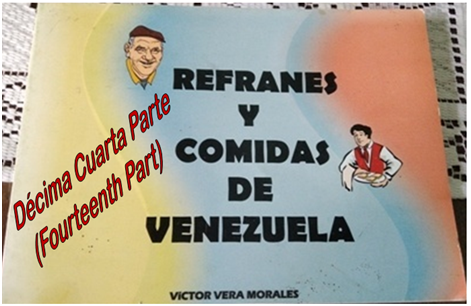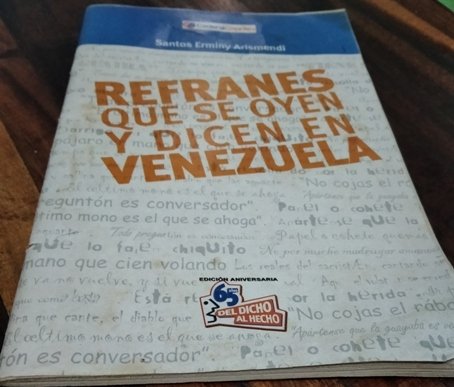[ESP/ENGL] Cinco sabios refranes venezolanos (Décima Cuarta Parte) // Five wise Venezuelan sayings (Fourteenth Part)


Es un dicho innegablemente optimista, jajaja, ya que valida el hecho que aún en las dificultades hay que conservar la buena actitud y el buen humor, porque esto garantiza que la situación mejore; y obviamente, una forma de subir el ánimo es cantando.
Quiere decir que lo desagradable, lo ingrato hace daño y produce malestar en las personas. Este refrán se utiliza generalmente para indicar que es necesario tomar medidas o acciones duras y contundentes, para darle una lección a otras personas.
Es imposible que un zamuro coma huesos, ya que solo ingiere las partes blandas de los cadáveres, razón por la cual se utiliza este refrán para indicar que hay cosas que no podemos hacer, que escapan de nuestras posibilidades, y esto nos frustra y genera impotencia.
Refrán que se emplea para indicar que se conoce el engaño con antelación, así esté disimulado. Dicho muy similar a “Yo conozco al renco, así esté sentado” y esto quiere decir que aún cuando no ve a la persona renca caminando ya sabe que tiene esa característica, lo que es alusivo al tema del engaño o la trampa, que aún cuando no esté a simple vista, es detectada.
Esto quiere decir, que hay que ser discreto y prudente. También guarda relación a lo que plantea La Biblia en el Evangelio de San Mateo, capítulo 6, versículo 3: “No dejes que tu mano izquierda sepa lo que hace la derecha”. También es un dicho que invita a no inmiscuirse en asuntos ajenos.



It is an undeniably optimistic saying, hahaha, since it validates the fact that even in difficulties it is necessary to maintain a good attitude and good humor, because this guarantees that the situation improves; and obviously one way to lift your spirits is by singing.
It means that the unpleasant, the ungrateful, hurts and causes discomfort in people. This saying is generally used to indicate that it is necessary to take hard and forceful measures or actions, to teach other people a lesson.
It is impossible for a vulture (zamuro) to eat bones, since it only ingests the soft parts of corpses, which is why this saying is used to indicate that there are things that we cannot do, that are beyond our possibilities, and this frustrates us and generates impotence.
Proverb that is used to indicate that the deception is known in advance, even if it is disguised. Said very similar to "I know the lame man, even if it is sitting" and this means that even when you do not see the lame person walking you already know that it has that characteristic, which is allusive to the theme of deception or the trap, which even when it is not in plain sight, is detected.
This means that you have to be discreet and prudent. It is also related to what the Bible says in the Gospel of Saint Matthew, chapter 6, verse 3: “Don't let your left hand know what the right hand is doing” . It is also a saying that invites you not to meddle in other people's affairs.
.png)
Dear readers, below I place the links of the first thirteen posts, in case you want to read them:
Víctor Vera Morales. (Agosto 2004). Refranes y Comidas de Venezuela. Editado por el Instituto Municipal de Publicaciones de la Alcaldía de Caracas.
Santos Erminy Arismendi. (2006). Refranes que se oyen y dicen en Venezuela. Cadena Capriles, Caracas. Venezuela.
- Fotos de mi autoría, tomada con un teléfono REDMI 8A, intervenida con WordArt / Photos of my authorship, taken with a REDMI 8A telephone, intervened with WordArt.
- Los diseños incluidos en esta publicación, han sido elaborados por mi persona con la aplicación CANVA / The designs included in this publication has been made by me with the CANVA application.
In the event that it is required to use the content or images of this post and my other publications, I would be grateful if my authorship (Fabiola Martínez) was made and the corresponding link was cited. Thank you.

 CommunityIIDiscord
CommunityIIDiscord
https://twitter.com/sirenahippie1/status/1375535134598909953
https://twitter.com/sirenahippie1/status/1375535134598909953?s=20
Number 3 is very important and certainly not over
Heloooo @lizelle,oh thanks, I'm glad to see you here, welcome to mi blog. Yes, the number 3 say a totally true. A big hug.
It's really interesting ... it seems like I like numbers 3 and 5....
Yeah, the 3 and the 5 are very good. Thanks for read my post @moex-photografy . A big hug.
Amiga como de costumbre me encantan tus publicaciones de éste típo no conocía ninguno de estos, eres genial mi querida @sirenahippie
Jajjaja, muchas gracias @actioncats seguiré publicando mis refranes para que la gente conozca cuán sabios somos los venezolanos (aunque no lo parezca), un gran abrazote.
I particularly liked number 4, and of course it reads better in Spanish. I love learning the psyche of cultures through proverbs. Thanks for sharing.
@NaturalMedicine supports wellness of body, mind, soul and earth on HIVE.
Come say hi via Lotus Chat or drop by our Hive Community - we'd love to have you!
And it makes me happy that people like my posts. Your comment is very successful, the customs of the places allow us to know the psyche of the peoples, they are like a very evident manifestation of what they think and do not say. Thank you for stopping by. A big greeting from Venezuela.